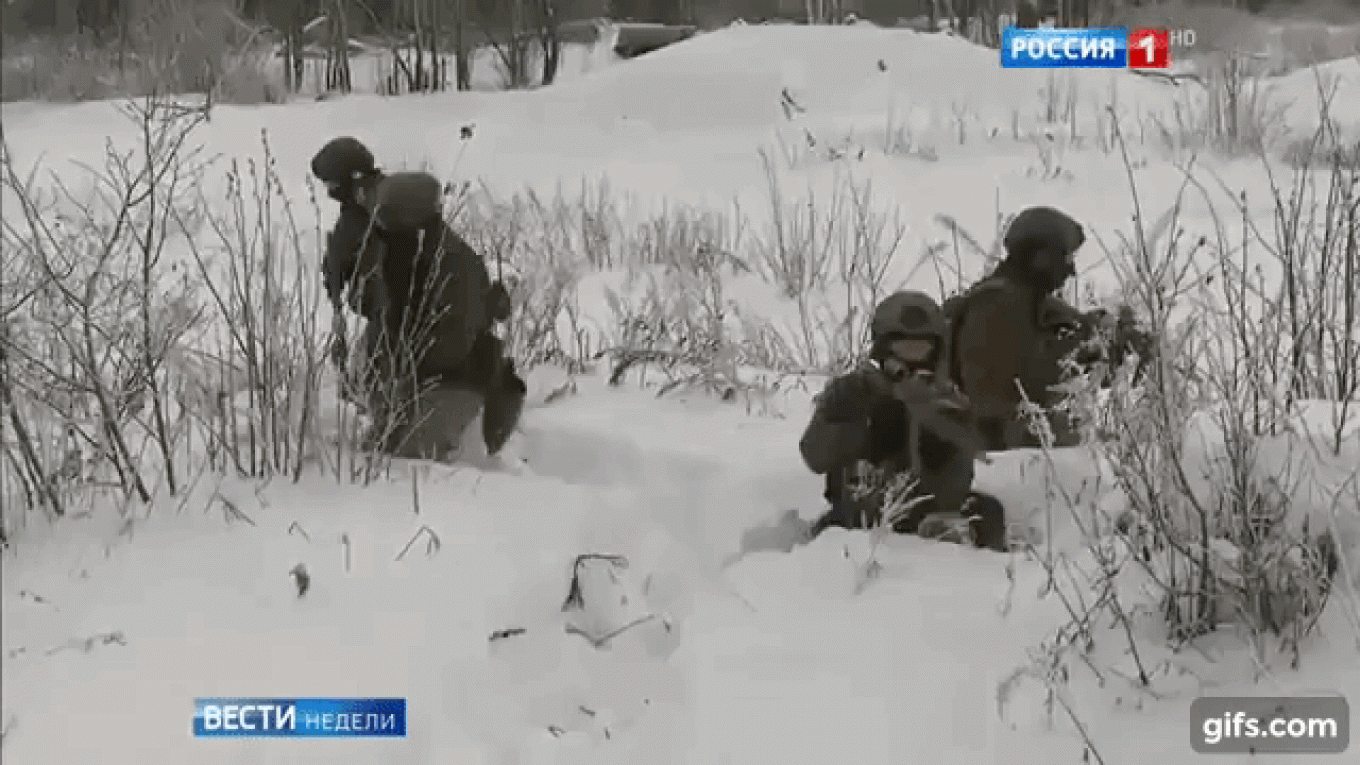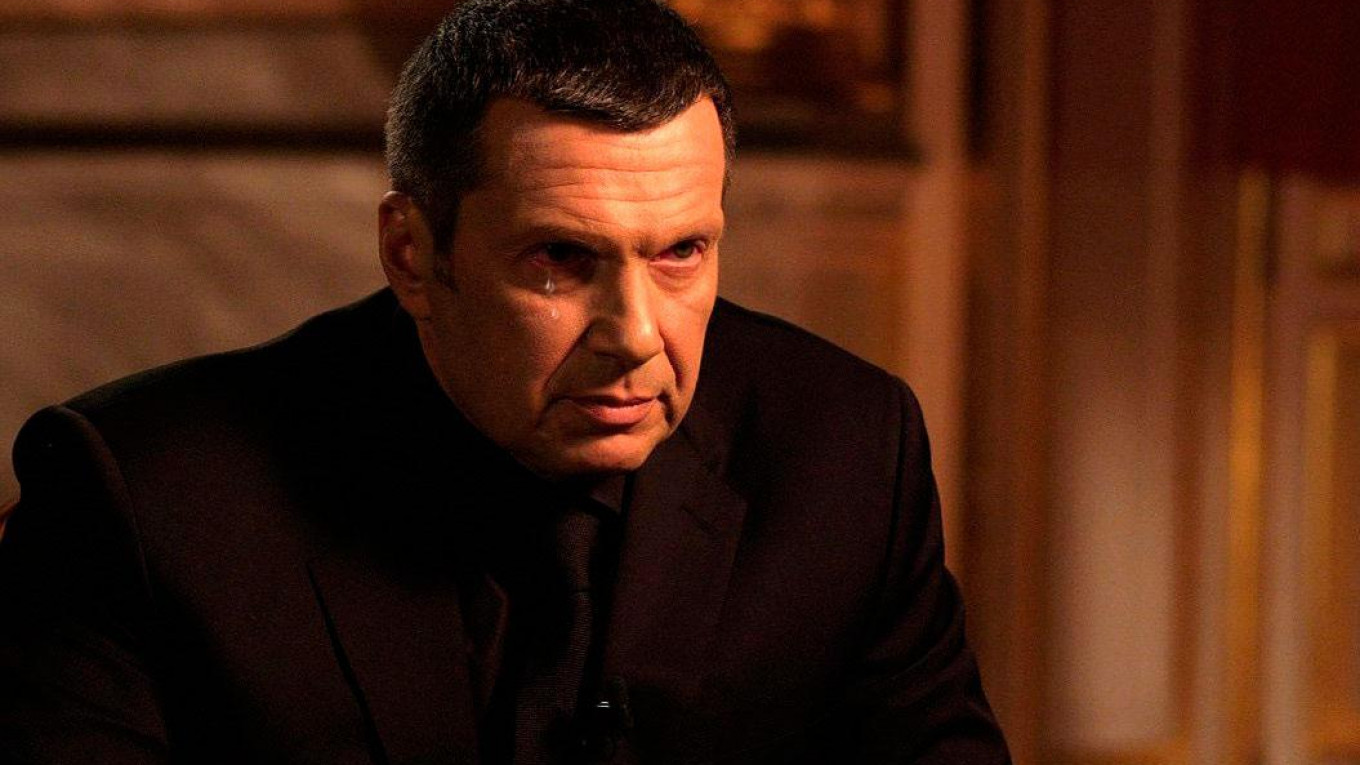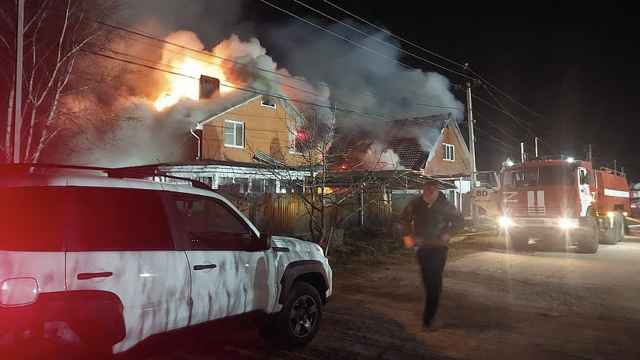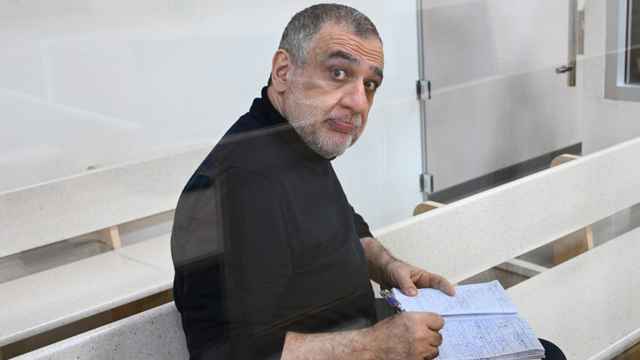Russia is the only force that’s fighting the “radicals” in Syria, unlike its Western counterparts, which are paralyzed by inaction and indifference to the suffering of Syrian civilians. Not only that, but the West is even sabotaging Russia’s diplomatic efforts at the U.N., and actively aiding terrorists in Syria and Iraq. Also, everyone except Russia is to blame for the loss of Palmyra.
That’s the gist of this Sunday’s flagship news shows on Russian television.
Dmitry Kiselyov, the Kremlin’s so-called “chief propagandist,” kicked off this Sunday’s “Weekly News” show with a striking comparison: while Russia is on the verge of a major breakthrough in Aleppo, the U.S.-led anti-ISIS coalition in Iraq is faltering. With a large chyron behind him reading “The Sloppiness of the US Military,” Kiselyov explained how the U.S. Air Force mistakenly bombed an Iraqi motorized brigade near Mosul, killing at least 90 Iraqi servicemen and injuring more than 100.
Kiselyov, the president of a media conglomerate that includes agencies that reported the friendly-fire story, didn’t seem to mind it was bogus news. Contrary to the reports in Russian state media, no friendly-fire incidents involving Iraqi troops and the U.S. Air Force took place on that day. A few hours after its original report, moreover, the RIA Novosti news agency (part of Kiselyov’s media empire) issued a follow-up report quoting an Iraqi army representative, who debunked the information.
Later in the program, Kiselyov defended Russia’s veto on the Syria resolution in the U.N. Security Council, supported by Beijing. It was a very rare move by China, Kiselyov said, which prefers to abstain rather than to vote against resolutions it doesn’t like. China’s veto was met with a “pompously hysterical tirade” from Matthew Rycroft, London’s U.N. envoy, as Kiselyov put it. His speech was “devoid of any content,” but also managed to be filled with “archaic lies” and “incoherent gobbledygook unworthy of a gentleman.”
“We’re watching the disintegration of British diplomacy,” Kiselyov said, explaining that the U.K.’s obsession with the “horrors” now underway in Aleppo comes from a country that “specializes in visiting all imaginable horrors on the Middle East.” “The bloody incursions into Iraq and Libya also deserve special mention,” he added.
The news anchor then described an angry rebuttal to Rycroft’s speech by China’s envoy who, according to Kiselyov, literally told the UK representative to “stop fouling the air in the room.” (That was not quite what the China envoy said.) At that moment, Kiselyov joked, the Chinese diplomat was probably replaying scenes of the atrocities wrought by the British on his country in the 19th century. To drive home this point, Kiselyov then followed his statement with a lengthy segment about the history of the Opium Wars.
For our roundup of last week's Sunday news on Russian television, see: Russian State TV Weekly Roundup: Mission Over in Aleppo
Meanwhile, according to Kiselyov’s show, the White House is in disarray and completely demoralized by Trump’s triumph. John Kerry is already packing his bags, having failed to secure any sort of a breakthrough in Syria. The U.S. secretary of state’s Order of the Legion of Honor, bestowed by France this Saturday, was pretty much like Obama's Nobel Peace prize — a participation trophy, Kiselyov said. Barack Obama's admission that the U.S. was an accessory to the emergence of the Islamic State could have been a breakthrough, but he still failed to apologize.
Kiselyov’s viewers were then treated to another historical reminiscence, this time from Russia’s own U.N. envoy, Vitaly Churkin, who has seen a lot in his long diplomatic career. The debates in the U.N. over the latest failed Syria resolution reminded Churkin of Colin Powell’s infamous moment in February 2003, when he presented faulty evidence that weapons of mass destruction existed in Iraq.
Kiselyov then proceeded with another angry tirade against the West. While Russian troops are on the verge of liberating Aleppo, the West is paralyzed by inaction and indifference towards Syria’s civilians. Russia is saving Aleppo and feeding its starving people, and Russian servicemen and women are dying in the process, while international organizations like the U.N. and European Union look on. Even a statement by the Red Cross about the tragic death of two Russian nurses in Aleppo was “uniquely cold-hearted,” Kiselyov said, because it equated those who were helping civilians in Aleppo and those who held them hostage.
By this point in the program, it became clear that Sunday, Dec. 11, would be an episode dedicated disproportionately to news from abroad. The opening 30-minute segment on Syria was followed by a soft, sympathetic interlude on Donald Trump being the first “Twitter president.” Then it was back to Syria. Curiously, this segment featured the commander of a special operations unit in the Russian military, who described several recent Syria missions in unusual detail, saying the targets were both “militants” and “ISIS itself.”

For months now, Russian officials and propaganda figures have vehemently denied that Moscow has “boots on the ground” in Syria, making Kiselyov’s interview with the special-ops commander remarkable. Suddenly, here was a Russian soldier talking openly on national television about exterminating “bandits” and “jihadists,” one by one or sometimes in groups as big as a dozen, using sophisticated precision weapons.
This segment on “Weekly News” is at odds with both earlier denials and a statement made on Monday by Valentina Matvienko, the speaker of the Russian parliament’s upper chamber. Quoted by the TASS news agency, she said in no uncertain terms that Russia has not sent any troops to Syria and is not planning to do so.
For more on Russia in Syria, see: Russia Says It Has No Plans to Send Ground Troops to Syria
Dmitry Kiselyov’s Sunday show airs before a program by another flamboyant TV personality, Vladimir Solovyov. This week, by the time Kiselyov’s show had ended, there was grave breaking news: ISIS forces had retaken Palmyra, an ancient site in the middle of the Syrian desert. Earlier this year, with enormous fanfare in the Russian media, the Syrian military liberated the city, thanks largely to Russian air support.
Russia’s triumph in Palmyra, which has little strategic importance but bears immense symbolic weight for all warring factions, was so central to Moscow’s propaganda effort that Russia immediately staged a massive, televised classical concert on the ruins of a historic temple.
In other words, the loss of Palmyra is hugely embarrassing for Russian TV pundits, whose panic was so evident on Sunday that Twitter users circulated screenshots of Solovyov’s tweets, mocking his reluctance to accept the city’s recapture by ISIS, comparing his reactions to the various stages of grief people experience in personal tragedies.
Unusually somber, Solovyov began his Sunday talk show with a grave announcement: Palmyra had fallen to a band of 5,000 ISIS militants who were “pouring out of every hole,” despite the Russian Air Force’s best efforts. After this announcement, Solovyov and the pundits in his studio spent about 40 minutes trying to assign blame for the loss of Palmyra.
Among the possible culprits were, in order of appearance, the Americans (who may have “redirected” ISIS forces from the Iraqi cities where a U.S.-led coalition is currently fighting), the Turks and Kurds (who are too busy fighting each other to tackle the ISIS stronghold in Raqqa), the Syrian secret services (who were too incompetent or traitorous to notice the mass movement of troops towards Palmyra), the international coalition (which forced a pause to the Russian bombing campaign in Aleppo, allowing the militants to regroup), some unnamed but heavily hinted at “neighboring countries” (which may be supplying arms and ammo to ISIS), the Syrian army (which is so incompetent that the war’s most difficult work falls to Russia), and Bashar Assad himself (who has failed even to conscript every Syrian man into the army).

But not all was doom and gloom this Sunday on Russian state television. After a long and torturous debate on who’s to blame for the loss of Palmyra, Solovyov and his guests turned to a familiar remedy for their sour mood: discussing all the things that are wrong with Ukraine. By the end of the two-hour show, everyone concluded gleamingly that there is indeed a country that has fared worse than Russia this week.
A Message from The Moscow Times:
Dear readers,
We are facing unprecedented challenges. Russia's Prosecutor General's Office has designated The Moscow Times as an "undesirable" organization, criminalizing our work and putting our staff at risk of prosecution. This follows our earlier unjust labeling as a "foreign agent."
These actions are direct attempts to silence independent journalism in Russia. The authorities claim our work "discredits the decisions of the Russian leadership." We see things differently: we strive to provide accurate, unbiased reporting on Russia.
We, the journalists of The Moscow Times, refuse to be silenced. But to continue our work, we need your help.
Your support, no matter how small, makes a world of difference. If you can, please support us monthly starting from just $2. It's quick to set up, and every contribution makes a significant impact.
By supporting The Moscow Times, you're defending open, independent journalism in the face of repression. Thank you for standing with us.
Remind me later.







